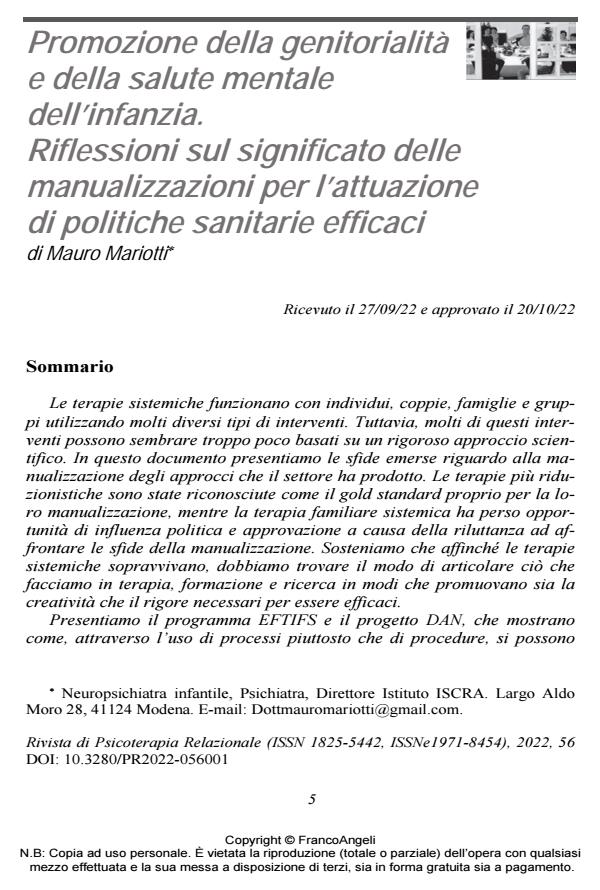Promoting parenting skills and childhood mental health. Reflections on the meaning of manualization toward the implementation of ef-fective health policies
Journal title RIVISTA DI PSICOTERAPIA RELAZIONALE
Author/s Mauro Mariotti
Publishing Year 2022 Issue 2022/56
Language Italian Pages 26 P. 5-30 File size 247 KB
DOI 10.3280/PR2022-056001
DOI is like a bar code for intellectual property: to have more infomation
click here
Below, you can see the article first page
If you want to buy this article in PDF format, you can do it, following the instructions to buy download credits

FrancoAngeli is member of Publishers International Linking Association, Inc (PILA), a not-for-profit association which run the CrossRef service enabling links to and from online scholarly content.
This paper argues that systemic therapies are well built to remedi-ate damages in systems such as individual, couples, families, and groups by using many different kinds of interventions. However, many of these interventions can come across as too driven by adherence to very specific epistemological position for one to believe they are scientifically based. In this paper, we present the challenges that have emerged regarding manualising the approaches that the field has produced. We explore how more reductionistic therapies have increasingly been recognized as the gold standard due to their simplified manual-ization, while family and systems therapy has missed opportunities for policy influence and government approval due to the reluctance to ad-dress the challenges of manualization. We contend that for systemic therapies to survive, we must find ways to articulate what we do in therapy, training and research in ways that foster both the creativity and the rigor needed to be effective. We present the program EFTIFS and the project DAN that shows how, through the use of processes ra-ther than procedures, one can produce manuals that allow therapists to be as complex and artistic as they wish but still maintain the focus on the scientific method that will enable them to be approved as evidence-based psychotherapies.
Keywords: manuals, systemic approach, process, creativity, rigour, evidence, EFTIFS, DAN.
Mauro Mariotti, Promozione della genitorialità e della salute mentale dell’infanzia. Riflessioni sul significato delle manualizzazioni per l’attuazione di politiche sanitarie efficaci in "RIVISTA DI PSICOTERAPIA RELAZIONALE " 56/2022, pp 5-30, DOI: 10.3280/PR2022-056001